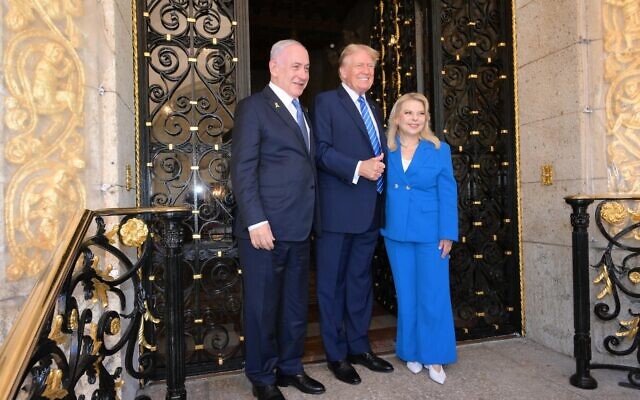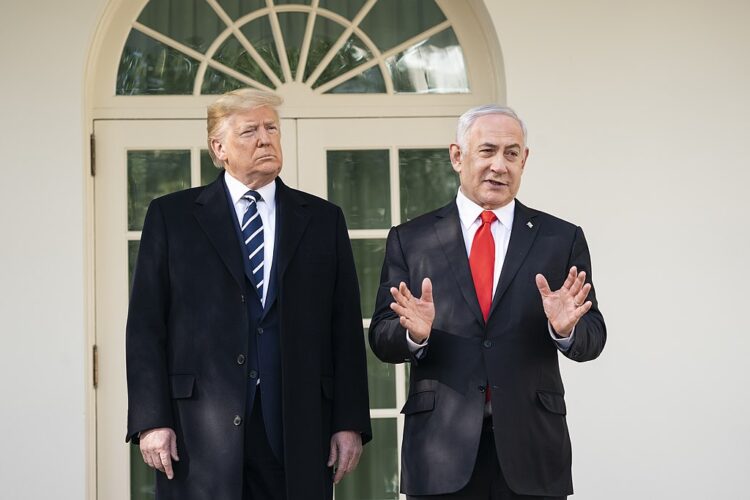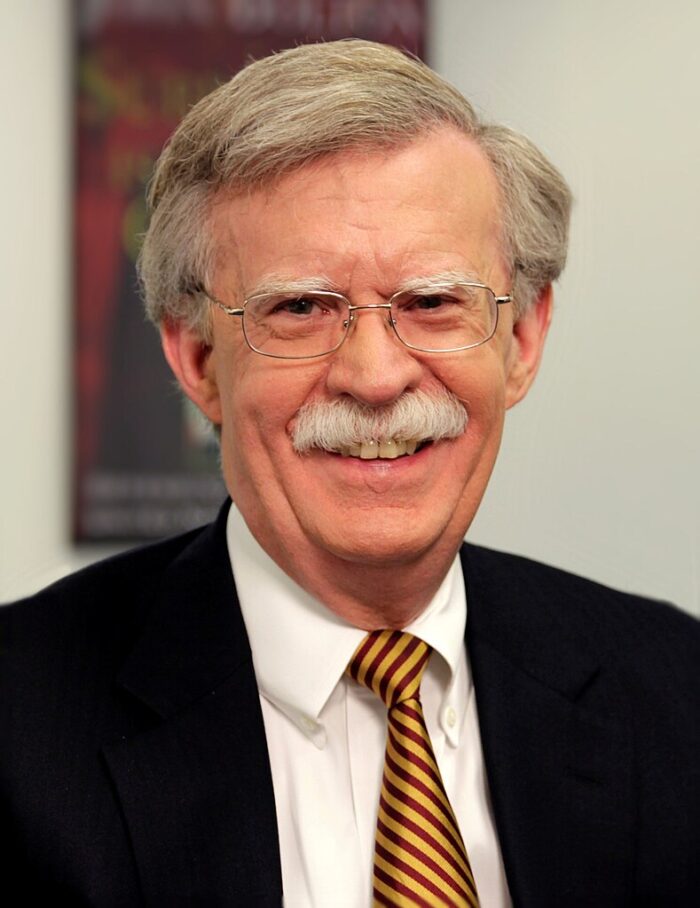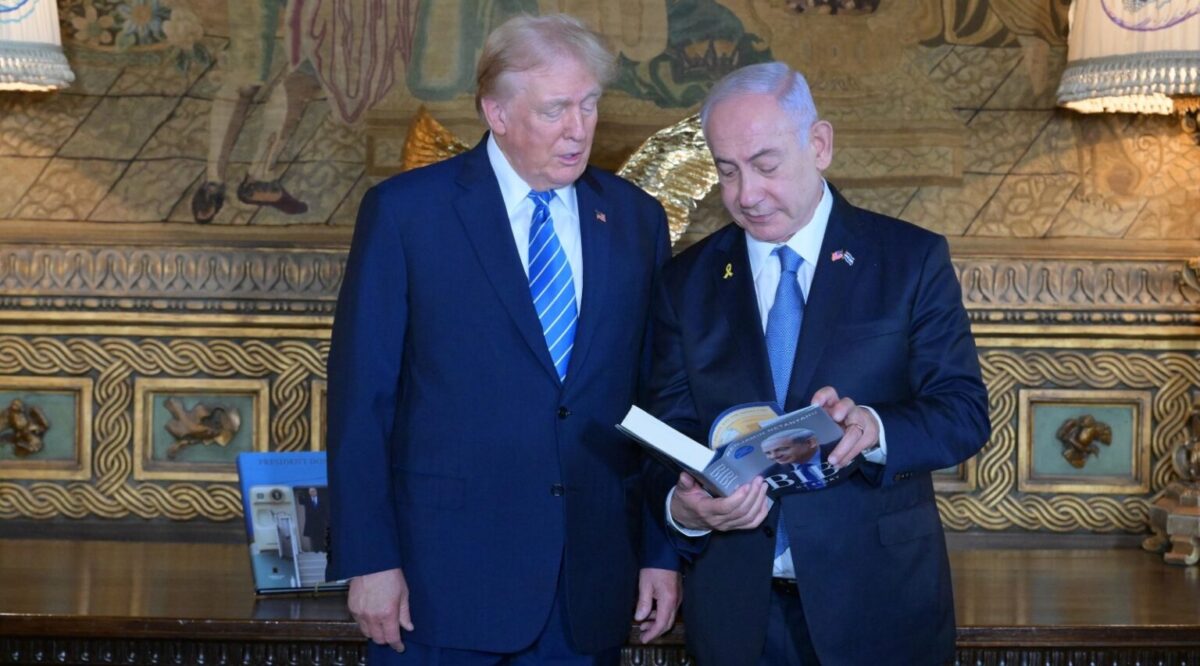It looks like Benjamin Netanyahu has repaired his frayed relationship with Donald Trump.
Trump, the former U.S. president and now the Republican Party candidate in the forthcoming presidential election, warmly welcomed Netanyahu and his wife, Sara, to his palatial Mar-a-Lago estate in Palm Beach on July 26.
They arrived in Florida at the end of a brief visit to the United States during which Netanyahu delivered his record fourth speech to the U.S. Congress, conferred with President Joe Biden in the White House, and met Vice-President Kamala Harris, the presumptive Democratic Party presidential nominee and Trump’s opponent in the next election.
Trump appeared to be in good spirits as he greeted the Netanyahus. Beaming ear to ear, he clasped Netanyahu’s hands and pulled him closer after planting kisses on his wife’s cheeks. “We missed you!” Sara declared as the three embraced.

“We’ve always had a great relationship,” Trump told reporters. “It was never bad.” He added, “I was very good to Israel, better than any president’s ever been.”
Netanyahu, having fallen out with Trump after Biden’s victory in the 2020 election, was eager for a reset. On the eve of his visit, an Israeli official disclosed that Netanyahu had phoned Trump on July 4 to wish him a happy U.S. Independence Day.
It was apparently the first time they had spoken since September 2020, when the Abraham accords were signed at the White House. Brokered by the Trump administration, they enabled Israel to normalize relations with the United Arab Emirates and Bahrain and with Morocco and Sudan later that year.
Trump, who fancies himself as the most pro-Israel president in American history, lashed out at Netanyahu after he phoned Biden to congratulate him on his ascendancy to the presidency. Convinced the election had been rigged in Biden’s favor, he accused Netanyahu of betraying him in an expletive-ridden rant.
Netanyahu, of course, had absolutely no alternative but to offer Biden his best wishes. Anything short of that would have been inconceivable and unacceptable. Besides, a procession of world leaders had already called Biden to offer their congratulations without any blowback from Trump..
Subsequently, Trump said that Netanyahu had “let us down” by declining to participate in the January 2020 assassination of Qassem Soleimani, the commander of Iran’s Quds Force, an arm of the Islamic Revolutionary Guards Corps.
More recently, Trump blamed Netanyahu for Israel’s lack of preparedness for Hamas’ October 7 invasion of southern Israel, an attack that triggered the Israel-Hamas war in the Gaza Strip.
Trump’s acerbic comments bothered Netanyahu, not only because he may yet reclaim the presidency but also because Israel’s strategic relations with the United States are of the utmost importance.
Mindful of these prime considerations, Netanyahu did not fail to mention Trump in his speech to the U.S. Congress.
“I want to thank President Trump for his leadership in brokering the historic Abraham Accords,” he said. In a reference to the July 13 assassination attempt on him in Butler, Pennsylvania, Netanyahu said, “Like Americans, Israelis were relieved that President Trump emerged safe and sound from that dastardly attack on him, dastardly attack on American democracy. There is no room for political violence in democracies.
“I also want to thank President Trump for all the things he did for Israel, from recognizing Israel’s sovereignty over the Golan Heights to confronting Iran’s aggression, to recognizing Jerusalem as our capital and moving the American embassy there. That’s Jerusalem, our eternal capital, never to be divided again.”
Trump, who craves recognition and can barely tolerate criticism, voiced his appreciation for Netanyahu’s remarks, knowing full well it would resonate in Republican circles.
In his four years in office, Trump fulfilled Netanyahu’s fondest wishes.
Breaking with U.S. policy and going where no president had previously ventured, he recognized united Jerusalem as Israel’s capital and proceeded to move the U.S. embassy in Tel Aviv to Jerusalem. He then ordered the construction of a new embassy building in Israel’s capital.
He recognized Israel’s sovereignty of the Golan Heights, which Israeli forces captured from Syria in the Six Day War.
He played an indispensable role in the emergence of the landmark Abraham accords, which further integrated Israel into the Arab world and opened the possibility of a historic rapprochement between Israel and Saudi Arabia, the seat of Islam.

He laid out a peace plan weighed heavily in Israel’s favor.
He recognized the legality of Israeli settlements in the West Bank.
He closed the PLO mission in Washington and stopped U.S. payments to UNRWA, the United Nations relief agency active in Palestinian refugee camps throughout the Middle East.
He pulled out of the 2015 Iran nuclear agreement, which was regularly denounced by the Israeli government as totally inadequate.
In the leadup to his most recent meeting with Netanyahu, Trump made a series of statements concerning Israel, the Middle East and American Jews.
He expressed dismay that Jewish Americans vote for the Democratic Party. “Any Jewish person who votes for a Democrat … should have their head examined,” he said. “I actually think they hate Israel. Any Jewish person that votes for Democrats hates their religion. They hate everything about Israel, and should be ashamed of themsmelves
He urged Israel to finish the Gaza war quickly, saying it is gravely damaging Israel’s image, but he has not called for a ceasefire.
He claimed the October 7 attack would not have taken place had he been president.
In a commentary on foreign students who take part in anti-Israel protests, he promised to deport them.
Much to Netanyahu’s annoyance, he hailed Hezbollah as “very smart” and, in a nasty dig, he branded Israeli Defence Minister Yoav Gallant as a “jerk.”
During his conversation with Netanyahu two days ago, he predicted that “major wars” in the Middle East and possibly a world war would erupt if the Democrats regain power.
Blasting Harris, Trump claimed that her position toward Israel is “disrespectful.” As he put it, “I actually don’t know how a person who’s Jewish can vote for her. But that’s up to them. She was certainly disrespectful to Israel, in my opinion.”
Subsequently, Trump claimed that Harris, whose husband and stepchildren are Jewish, skipped Netanyahu’s speech in Congress due to antisemitism. “She doesn’t like Jewish people,” he said. “She doesn’t like Israel. That’s the way it is, and that’s the way it’s always going to be. She’s not going to change.”
Trump’s allegation is nothing more than wild conjecture, a talking point that damages his credibility and reliability, at least in the eyes of his detractors.

John Bolton, Trump’s former national security advisor who has broken with him, warned recently that he is fickle and changeable. As he said, “Trump’s support for Israel in the first term is not guaranteed in the second term because his positions are made on the basis of what’s good for Donald Trump, not on some coherent theory of national security.”
If Bolton is right, Israelis may be in for a rough ride should Trump triumph over Harris in the November election.
